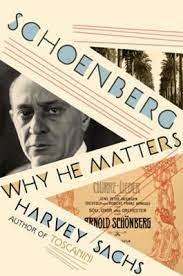‘A sterling example of the good old-fashioned and sadly vanishing “music appreciation” writer’
NewsThat’s composer John Adams’ delivery of death by faint praise to Harvey Sachs’s new book on Schoenberg in the New York Times.
He adds:
‘For Sachs at age 77 to produce this impassioned defense of Schoenberg, composer of some of the most difficult and intimidating music ever written, might seem surprising, but the totality of Schoenberg’s life — as composer, painter, writer, teacher, exiled Jew and profoundly influential thinker — comprises one of the great narratives of 20th-century Western culture, and one can see how the story of this artist’s struggle for acceptance against the backdrop of the societal calamities of his era was so appealing to Sachs.’
More here.






Not at all damning. I look forward to reading the book.
Exactly so, Tom. Do read the review, Norman: it’s a rave.
I suspect Schoenberg did not take his painting that seriously. ( I sure don’t.) His good friend, Kandinsky, invited him to show with the Blau Reiter group and he refused. He didn’t have sufficient confidence in it.
“…difficult and intimidating music…”
We never seem to consider the likelihood that it is poor and ineffective music.
That is the most fitting analysis of it and yet we’ve wasted a century pretending to see the invisible clothes.
I look forward to a day when we can abandon that pretension that it has some deeply merit that may be surfaced, if only we put in more years of study.
You pays your money and you takes yer cherce. Everything isn’t for everyone.
I’ve also given Schoenberg his chance and come to the conclusion that he was just not generally a very good composer. The early ”Romantic” works are derivative and would hardly get attention without his later notoriety, and others were better twelve-tone composers. He does seem to have his merits as a pedagogue, though (one could argue that Schoenberg’s best work was Alban Berg), and the ”freely atonal” middle period contains some interesting moments, although they feel more like experiments or aperçus the following generation could build upon than successful complete works.
“and would hardly get attention”
They got Mahler’s attention, but would hardly get yours. Sounds like a good deal.
Are all these anti-Schoenberg sentiments here for real? If so, what a sadly reactionary age we’re living in.
Does Schoenberg need a defense? Since when?
The failing of twelve tone serialism is what happens when you promote an ideology above all other considerations. It never works! It’s not reactionary when people ultimately like what they like and vote with their feet!